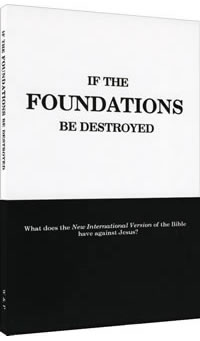Did the Catholic Church Really Give Us the Bible?
By David Daniels
"The Bible came through the Catholic Church."
Today this statement is universally accepted both in the church world and in secular history. Author Gail Riplinger, in her new book "In Awe of Thy Word", spends several hundred pages proving that this is wrong.
Even a casual look at the evidence discloses that there were two streams of scripture that flowed from apostolic times. Most history books follow just one stream that flows from Jerusalem down through Alexandria, Egypt and up into Rome.
Along the way the stream became polluted with heretical teachings. The corrupt Vaticanus and Sinaiticus manuscripts are products of that stream. The Bible produced from these manuscripts is the Bible that the Vatican claims to have given the world. These provide the basis for all the modern Bible versions.
But when this polluted stream of scripture arrived in Rome, it became mired in the political bog of what we now call Roman Catholicism. For over a thousand years, superstition, ignorance and organized corruption locked this Bible away from the common man.
But Riplinger's research uncovers another stream that flows up from Jerusalem through Antioch in Syria where the disciples were first called Christians. (See Acts 11:26.) Citing hundreds of passages from documents largely ignored by historians, she proves that a pure version of the Scriptures was agreed upon as early as 100 AD and copies began to follow the trade routes north and west as missionaries took up the great commission.
Rome did everything within her power to stamp out the Christians who had these pure Scriptures. During the dark ages the harlot church burned every copy she could get her hands on. But God had promised to preserve His Words.
When the printing press became available, men like Wycliffe and Zwinglie took the manuscripts from that stream and translated them into the common languages. The ignorance of God's Word was broken. The result was the Reformation that shattered the bondage of the popes.
Riplinger pieces together scraps of history proving the existence of a Gothic Bible as early as 350 AD and the text almost exactly matches the textus receptus that formed the basis for the KJV. Studies reveal that it was a word-for-word, literal equivalence translation from the Antioch stream of Greek scriptures.
Riplinger traces this northern stream of scripture from the Goths, through the Visigoths, Anglo-Saxons, Old English, into the time of Wycliffe and on to King James.
At the same time, Riplinger provides dozens of charts of specific scriptures where the original Gothic version matches the KJV while the same verses are either missing or differ in meaning in the modern versions based on the other, Alexandrian/ Roman Catholic, stream of manuscripts.
Riplinger's evidence is powerful, early testimony to the purity of the KJV. The sterling agreement of the northern stream of manuscripts stand in stark contrast to the muddled confusion found in the southern, Alexandrian/ Vatican manuscripts.
It is technically true that the Catholic Church gave us a Bible. But it is a Bible based on flawed manuscripts full of contradictions and inconsistencies. The confusion in the church today caused by the gaggle of versions was birthed by an attempt to "fix" the "archaic" language of the KJV. But that fix was dipped from the southern stream of corrupt manuscripts. The Bible that was "given" by the Roman Catholic Church is a counterfeit Bible, designed to sideline and eventually eliminate God's preserved Words in the King James Bible.
Riplinger's new book is a weighty volume but provides more overwhelming evidence how God went about preserving His Words in the KJV. It presents damning testimony against the pope's claim that God's preserved Words came through the Vatican institution identified in Revelation as the prostitute church.
- See more articles on related topics:
- Bible Versions
- Catholicism
- Ecumenism
- Changes in Bible Versions
- Two Types of Bible Versions
- History of Preservation
Other Articles from July/August 2004:
- Have You Ever Told a Lie?
New Video Helps People See How Un-Good They Are
- A Message From Jack Chick
- Chick Mail Bag July 2004
- Pollster Finds Only 7 Percent of U.S. Adults
are Bible Believers.
- Pope Wants UN to Become 'Moral Center'
- Prison Ministry Letters
- Worldwide Drive for 'Tolerance' Does Not Include the Gospel
- Tract Passing Tips - July 2004
- 'Nothing Could Be Closer to the Truth'
More on Bible Versions:
Products of Interest:
-

Did the Catholic Church Give Us the Bible?
208 pages
The Bible has two histories. One is of God preserving His words through His people. The other is of the devil using Roman Catholic "scholars" to pervert God’s words and give us corrupt modern Bibles. -

If The Foundations Be Destroyed
98 pages
What does the NIV have against Jesus? Is your Bible missing important verses and doctrines? If it is an New International Version there's a lot missing!



